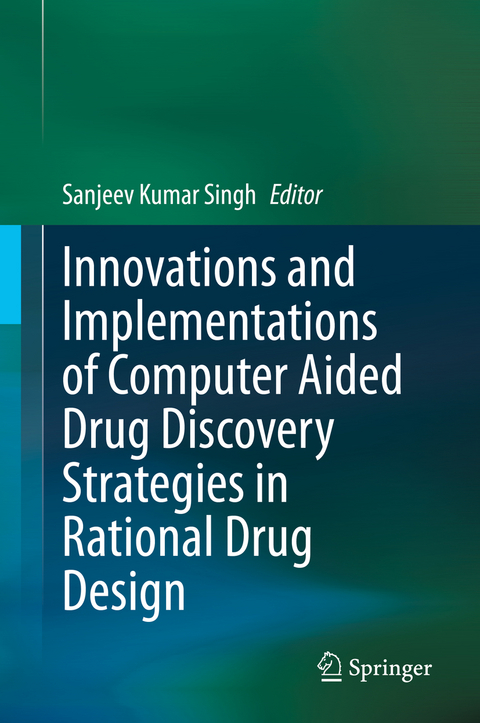
Innovations and Implementations of Computer Aided Drug Discovery Strategies in Rational Drug Design
Springer Verlag, Singapore
978-981-15-8935-5 (ISBN)
This book presents various computer-aided drug discovery methods for the design and development of ligand and structure-based drug molecules. A wide variety of computational approaches are now being used in various stages of drug discovery and development, as well as in clinical studies. Yet, despite the rapid advances in computer software and hardware, combined with the exponential growth in the available biological information, there are many challenges that still need to be addressed, as this book shows.
In turn, it shares valuable insights into receptor-ligand interactions in connection with various biological functions and human diseases. The book discusses a wide range of phylogenetic methods and highlights the applications of Molecular Dynamics Simulation in the drug discovery process. It also explores the application of quantum mechanics in order to provide better accuracy when calculating protein-ligand binding interactions and predicting binding affinities. In closing, the book provides illustrative descriptions of major challenges associated with computer-aided drug discovery for the development of therapeutic drugs. Given its scope, it offers a valuable asset for life sciences researchers, medicinal chemists and bioinformaticians looking for the latest information on computer-aided methodologies for drug development, together with their applications in drug discovery.
Dr. Singh is currently Professor at Department of Bioinformatics, Alagappa University, Karaikudi (TN), India. He received his graduation, post graduation and Doctoral degree in Theoretical chemistry from the CSJM University, Kanpur. Before joining Alagappa, he worked as scientist in NIPER, Mohali, Punjab and Assistant Professor, Madurai Kamaraj University, Tamil Nadu. Prof. Singh possess extensive exposure and achieved a distinct landmark in the area of Drug Discovery and development on specific therapeutic targets of Viruses, Bacterial pathogens and Cancer. He has received “ICMR Lala RAM Chand Kandhari Award and Fellow of BRSI Award”. He is the Secretary General of Bioinformatics and Drug Discovery Society (BIDDS), and MNASc, Member of “The National Academy of Sciences”, India and published more than 130 research articles in highly reputed journals.
Chapter 1. CADD: Some success stories from Sanjeevini and the way forward.- Chapter 2. Virtual Screening: practical application of docking, consensus scoring and rescoring using binding free energy.- Chapter 3. Aspects Of Protein Structure, Function And Dynamics In Rational Drug Designing.- Chapter 4. Role of advanced computing in the drug discovery process.- Chapter 5. Protein structure, dynamics and assembly: Implications for drug discovery.- Chapter 6. Recent trends in computer-aided drug design.- Chapter 7. Predicting Protein Folding and Protein Stability by Molecular Dynamics Simulations for Computational Drug Discovery.- Chapter 8. Magnitude and advancements of CADD in identifying therapeutic intervention against Flaviviruses.- Chapter 9. Elucidating protein-ligand interactions using high throughput biophysical techniques.- Chapter 10. In silico approach in drug design and drug discovery: An update.- Chapter 11. Biological Implications of Polyethylene Glycoland PEGylation: Therapautic Approaches Based on Biophysical Studies and Protein Structure-Based Drug Design Tools.- Chapter 12. Molecular Dynamics Simulation in Drug Discovery: Opportunities and Challenges.- Chapter 13. Theoretical characterization of intrinsically disordered proteins and relevant forcefields for them.
| Erscheinungsdatum | 05.02.2021 |
|---|---|
| Zusatzinfo | 56 Illustrations, color; 23 Illustrations, black and white; VII, 333 p. 79 illus., 56 illus. in color. |
| Verlagsort | Singapore |
| Sprache | englisch |
| Maße | 155 x 235 mm |
| Themenwelt | Mathematik / Informatik ► Informatik ► Theorie / Studium |
| Informatik ► Weitere Themen ► Bioinformatik | |
| Naturwissenschaften ► Biologie ► Biochemie | |
| Naturwissenschaften ► Biologie ► Genetik / Molekularbiologie | |
| ISBN-10 | 981-15-8935-6 / 9811589356 |
| ISBN-13 | 978-981-15-8935-5 / 9789811589355 |
| Zustand | Neuware |
| Informationen gemäß Produktsicherheitsverordnung (GPSR) | |
| Haben Sie eine Frage zum Produkt? |
aus dem Bereich


